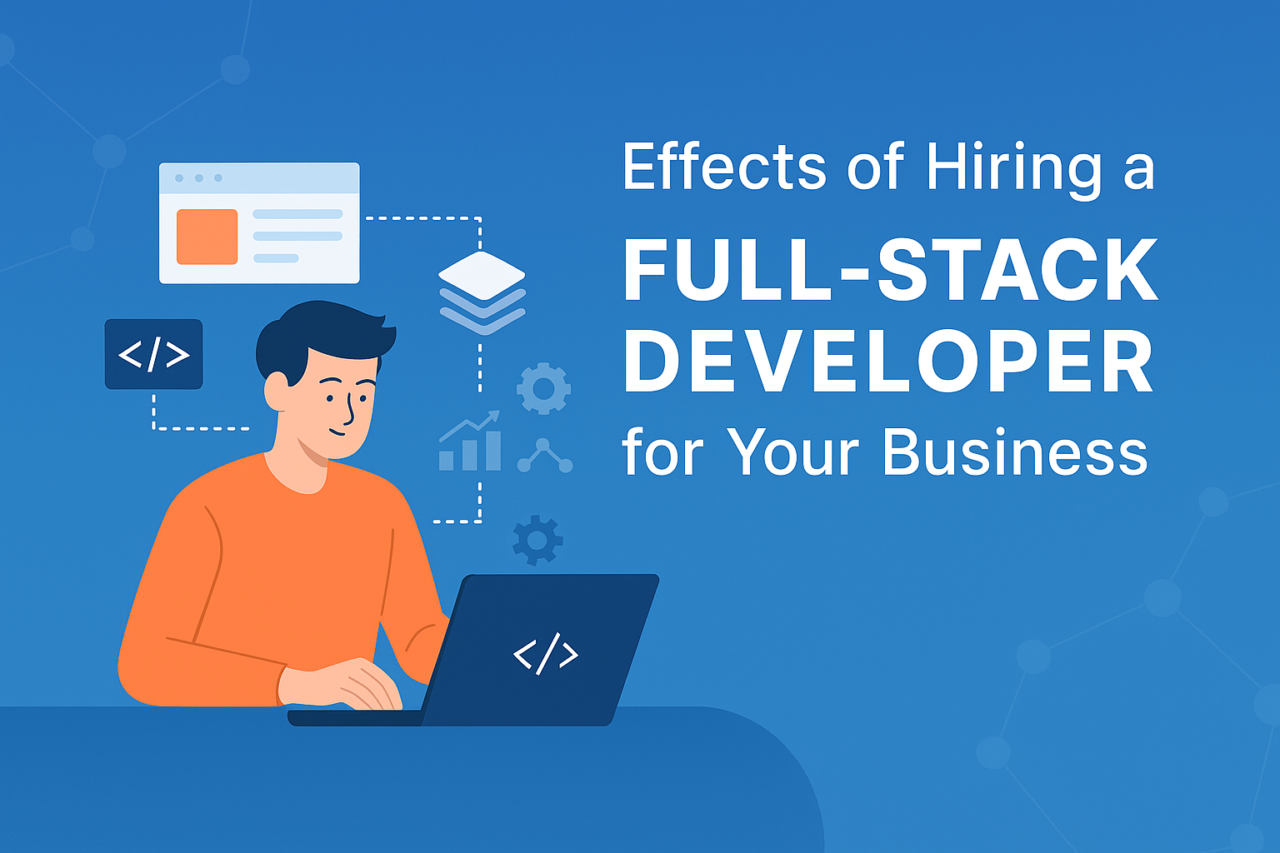Businesses have to continuously innovate and improve their digital presence to stay ahead of the curve since technological advances are reshaping industries at a rate never seen before. The position of a full-stack developer becomes essential in this fast-paced situation. Businesses seeking to prosper in today’s fast-paced and competitive industry require the strategic decision to hire a full-stack developer.
The full-stack developer is essential to supporting creativity and productivity, whether they are designing user-friendly user interfaces, building reliable backend systems, or incorporating modern technologies. Employing a full-stack developer gives businesses a competitive edge when attempting to manage the complex web of modern business issues. The size of the worldwide web development market was estimated at USD 56000.0 million in 2021 and is projected to grow at a compound annual growth rate (CAGR) of 8.03% to reach USD 89013.17 million by 2027.
Effects of Hiring a Full-Stack Developer
- Budget-friendly
- Increased project control
- Higher innovation
- Adaptability to Emerging Technologies
- Holistic Understanding of Projects
- Extensive Experience In Software Development
1. Budget-friendly
Although full-stack developers have a broad skill set and can handle both front-end and back-end development work, hiring them is affordable for businesses. Companies can avoid employing several specialists by having a single developer who is skilled in multiple technologies. The ability of full-stack developers to swiftly adjust to shifting project requirements reduces the need for new hiring or training.
2. Increased project control
Employing a full-stack developer gives companies better project control since they combine knowledge from all areas of the development stack. Their coordinated strategy guarantees a coherent vision and prompt project requirements response, reducing disruptions and increasing efficiency. Full-stack developers provide organisations with more control over the course and results of their projects since they have a thorough awareness of all the project’s complications.
3. Higher innovation
Employing a full-stack developer allows companies to take advantage of their profound skill set and comprehensive approach, which promotes increased innovation. Their detailed understanding of the development process allows them to suggest innovative methods that optimise effectiveness and productivity. Full-stack developers frequently bring new perspectives and innovative concepts to the table, which encourages creativity and constant team improvement.
4. Adaptability to Emerging Technologies
Employing a full-stack developer gives companies flexibility when it comes to new technologies because of their extensive skill set of multiple programming languages and frameworks. With the help of advanced structures and tools, companies may stay ahead of the curve and improve their goods and services. Full-stack developers’ flexibility and quick learning ensures that companies can take advantage of new trends and possibilities.
5. Holistic Understanding of Projects –
Employing a full-stack developer helps firms understand projects more comprehensively since they have a thorough understanding of both front-end and back-end features. Their comprehensive knowledge empowers them to make well-informed selections that match the project’s overall objectives and specifications. Throughout the project lifecycle, full-stack developers maintain clarity and efficiency by bridging the gap between various levels of development.
6. Extensive Experience In Software Development
Employing a full-stack developer gives companies access to a wealth of front-end and back-end software development knowledge. Their expertise enables effective problem-solving and enhanced development procedures. The practical experience that full-stack developers have gained from working on numerous projects gives them the knowledge to predict problems and put workable solutions in place. By making full use of their vast expertise, companies may shorten development schedules and provide high quality.
How to Hire a Full-Stack Developer?
The first step in hiring a full-stack developer is to specify exactly what knowledge and expertise your team or project needs. Write an in-depth resume that highlights the frameworks and technologies that are important to your stack. Post job openings on job boards, professional networking sites, and development forums to draw in applicants. To evaluate their topic knowledge and problem-solving abilities, conduct technical interviews. Take into account hands-on evaluations or coding competitions to measure their coding skills and methodology. To ensure connection with possible applicants, be specific in your communication regarding project goals, expectations, and business culture. Lastly, make employment offers to the best applicants and successfully integrate them into your team.
The Bottom Line
A full-stack developer’s position is critical, acting as an entry point in this ever-changing landscape. Businesses that want to succeed in the fast-paced, highly competitive industries of today must intentionally choose to hire full-stack developers because of their importance. Businesses can manage the complex problems of modern business with a competitive edge by hiring a full-stack developer. Hiring a developer has many benefits: it’s cost-effective since it combines various expertise, improves project management by providing an in-depth understanding of projects, encourages creativity, makes it easier to adjust to new technologies, and makes use of years of software development experience. Including a full-stack developer in the team can greatly improve a business’s ability to grow and innovate in the current digital environment.


